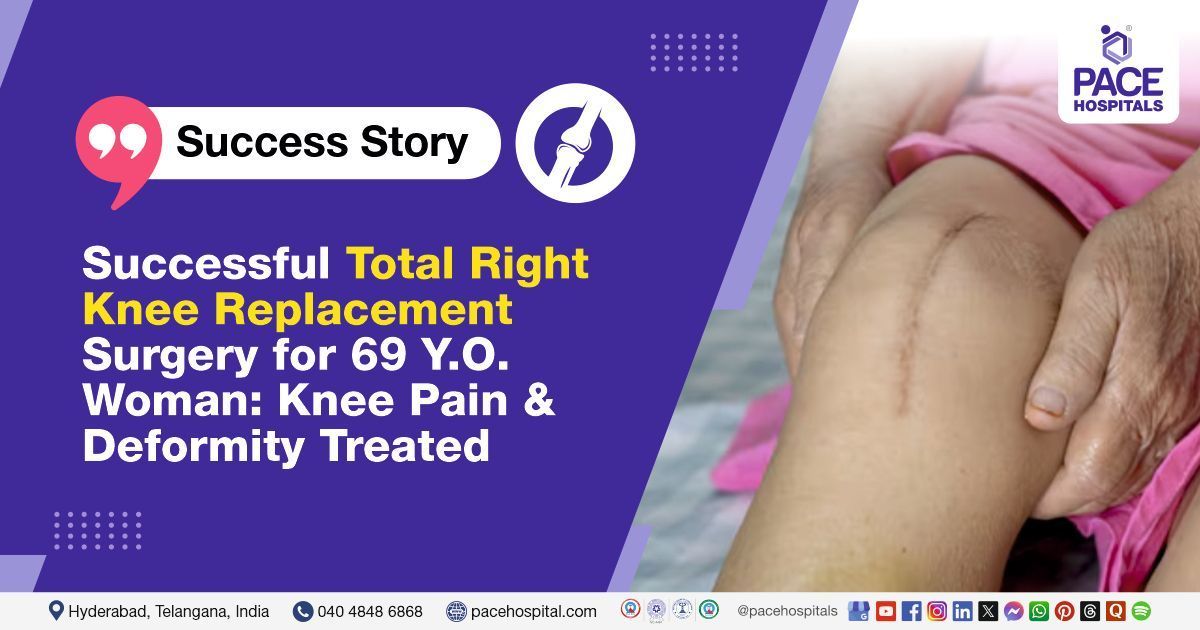Successful Total Right Knee Replacement for 69-Year-Old Woman with Severe Osteoarthritis
PACE Hospitals
PACE Hospitals’ orthopaedics team successfully performed a total right knee replacement surgery for a 69-year-old female patient with complaints of pain and deformity in the right knee.
Chief Complaints
A 69-year-old female patient presented to the Orthopaedics Department at
PACE Hospitals, Hitech City, Hyderabad, with complaints of pain and deformity in her right knee, which had been ongoing for the past few months.
Medical History
Getting into more detail, it was understood that the patient had been experiencing pain in both knees for the past few years, with the right knee being more affected than the left. Over time, the pain in the right knee had intensified, leading to difficulty in walking and using stairs. This pain had significantly impacted her ability to perform daily activities.
The patient is a known case of intervertebral
disc prolapse (IVDP) in the lumbar spine, accompanied by radiculopathy affecting the right lower limb. She is currently receiving regular treatment and is under the care of a spine surgeon for ongoing management and monitoring of her condition.
On examination
Upon admission to PACE Hospitals, the patient’s vital signs were stable. Examination of the right knee revealed effusion and tenderness along the joint line. The knee’s range of motion was limited and painful. There were no signs of
deep vein thrombosis (DVT).
Diagnosis
Following a comprehensive assessment, the doctors diagnosed the patient with pain and deformity in the right knee. Further diagnostic tests confirmed the presence of severe osteoarthritis in the right knee. This condition was identified as the primary cause of her symptoms.
Medical Decision Making
Considering the patient's pain and difficulty in carrying out daily tasks, along with the diagnosis of severe osteoarthritis of the right knee, it was decided that surgical intervention was required. After a comprehensive discussion with the patient's family and obtaining their informed consent, Dr. Raghuram, Consultant Orthopaedic Surgeon, decided to proceed with a total right knee replacement.
Surgical Procedure
Upon admission with right knee osteoarthritis, the patient was evaluated and deemed fit for surgery. She then underwent a right-sided Total Knee Replacement (TKR) procedure, which was performed under general anaesthesia.
Total knee replacement (TKR) is a surgical procedure in which a damaged or arthritic knee joint is replaced with an artificial prosthesis. It is commonly performed on patients experiencing severe knee pain, stiffness, and limited mobility. The recovery process can take several months, and the goal of TKR is to alleviate pain, improve joint function, and enhance the patient’s overall quality of life.
Intra operative Findings
A patient was positioned in a supine position with a tourniquet applied for blood control. A midline incision was made to access the knee joint, allowing exposure of the femur, tibia, and patella's articular surfaces. Precise cuts were made to prepare the bones for prosthetic components. The patellar surface was also prepared, and any osteophytes were removed for a smooth joint surface. Trial implants were inserted to assess the joint's fit, alignment, and stability of the joint. A cemented total knee replacement was completed, and the wound was closed in layers using Vicryl 2-0 staples for skin closure. This procedure is typically performed to alleviate pain and restore function in patients with severe knee joint arthritis or degeneration.
Postoperative Care
The postoperative period was uneventful. Physiotherapy helped the patient in regaining mobility during the recovery phase. The wound dressings were changed regularly and found to be clean. The patient was discharged in a stable condition.
Medications Advised at the stay
During the hospital stay, the patient was prescribed medications including antibiotics, analgesics, and supportive medications.
Discharge Medications
Upon discharge, the patient was prescribed antibiotics, pain relievers, proton pump inhibitors (PPIs), non-steroidal anti-inflammatory drugs (NSAIDs), as well as dietary and vitamin supplements.
Advice on Discharge
The patient was advised to walk with a walker for support.
Emergency Care
The patient’s family were instructed to visit the emergency ward of PACE Hospitals, Hyderabad, in case of any symptoms such as fever, worsening knee pain, swelling, or any abnormal drainage from the surgical site.
Review notes
The patient was scheduled for a follow-up visit after one week in the Orthopaedics OPD at PACE Hospitals, Hyderabad, to monitor the surgical site and change the dressings.
The Importance of Epidural Anaesthesia in Total Right Knee Replacement Surgery
Epidural anaesthesia is a widely used technique in total right knee replacement surgery, providing effective pain relief and muscle relaxation. This method involves injecting anaesthetic agents into the epidural space surrounding the spinal cord. By offering targeted pain management, epidural anesthesia reduces the need for general anaesthesia, minimizing associated risks. It ensures complete numbness of the lower body, including the knee joint, which enables the surgeon to perform the procedure with enhanced precision and control.
Additionally, epidural anaesthesia helps reduce blood loss during surgery and accelerates the recovery process, allowing patients to begin mobilizing shortly after the procedure. One of its key benefits is postoperative pain management, as it continues to provide relief during the early recovery phase, helping patients manage discomfort without relying on systemic narcotics. Overall, epidural anesthesia contributes to a smoother surgical experience, faster recovery, and improved outcomes for patients undergoing total knee replacement surgery.
Share on
Request an appointment
Fill in the appointment form or call us instantly to book a confirmed appointment with our super specialist at 04048486868
Appointment request - health articles
Recent Articles











